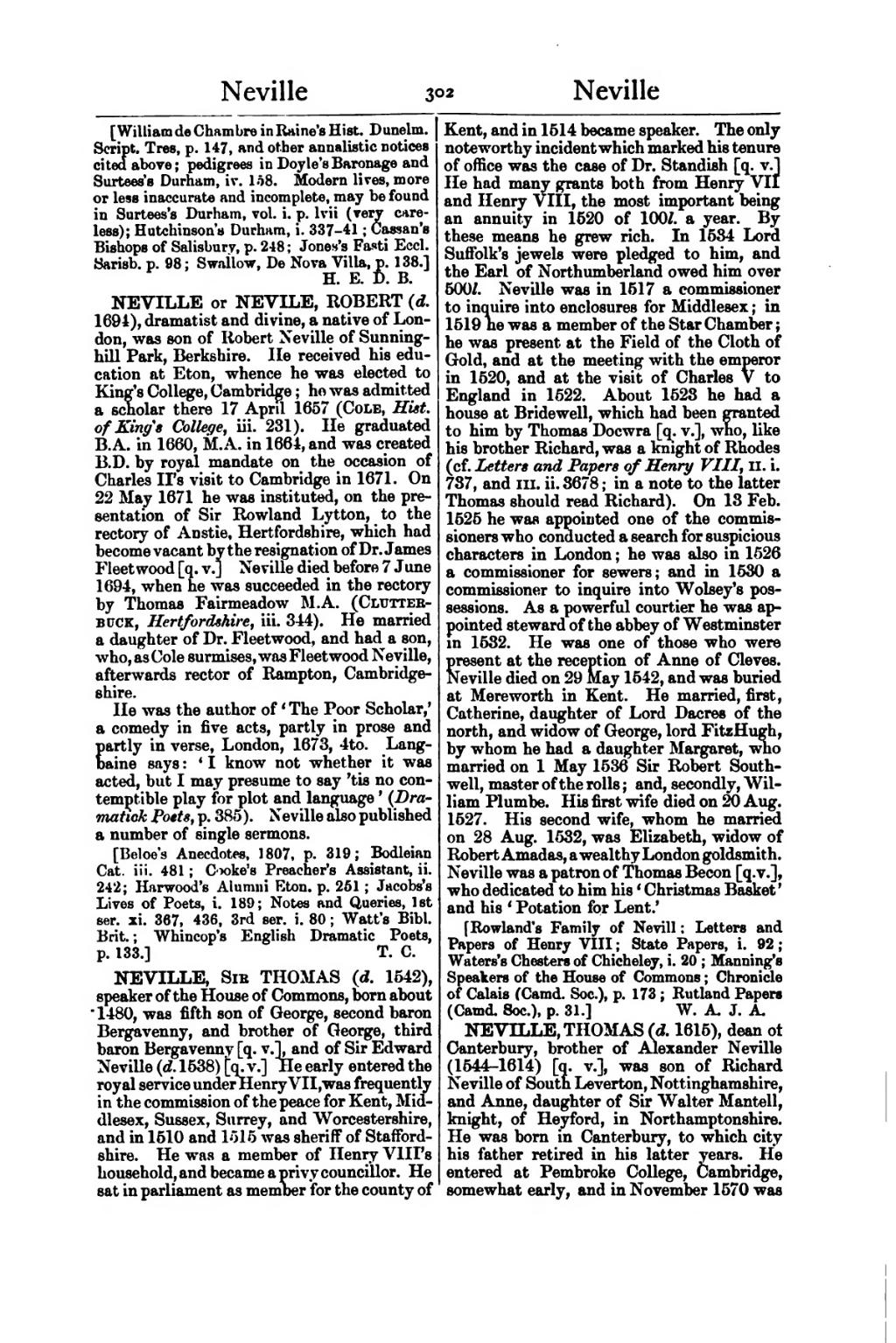[William de Chambre in Raine's Hist. Dunelm. Script. Tres, p. 147, and other annalistic notices cited above; pedigrees in Doyle's Baronage and Surtees's Durham, iv. 158. Modern lives, more or less inaccurate and incomplete, may be found in Surtees's Durham, vol. i. p. lvii (very careless); Hutchinson's Durham, i. 337–41; Cassan's Bishops of Salisbury, p. 248; Jones's Fasti Eccl. Sarisb. p. 98; Swallow, De Nova Villa, p. 138.]
NEVILLE or NEVILE, ROBERT (d. 1694), dramatist and divine, a native of London, was son of Robert Neville of Sunninghill Park, Berkshire. He received his education at Eton, whence he was elected to King's College, Cambridge; he was admitted a scholar there 17 April 1657 (Cole, Hist. of King's College, iii. 231). He graduated B.A. in 1660, M.A. in 1664, and was created B.D. by royal mandate on the occasion of Charles II's visit to Cambridge in 1671. On 22 May 1671 he was instituted, on the presentation of Sir Rowland Lytton, to the rectory of Anstie, Hertfordshire, which had become vacant by the resignation of Dr. James Fleetwood [q. v.] Neville died before 7 June 1694, when he was succeeded in the rectory by Thomas Fairmeadow, M.A. (Clutterbuck, Hertfordshire, iii. 344). He married a daughter of Dr. Fleetwood, and had a son, who, as Cole surmises, was Fleetwood Neville, afterwards rector of Rampton, Cambridgeshire.
He was the author of ‘The Poor Scholar,’ a comedy in five acts, partly in prose and partly in verse, London, 1673, 4to. Langbaine says: ‘I know not whether it was acted, but I may presume to say 'tis no contemptible play for plot and language’ (Dramatick Poets, p. 385). Neville also published a number of single sermons.
[Beloe's Anecdotes, 1807, p. 319; Bodleian Cat. iii. 481; Cooke's Preacher's Assistant, ii. 242; Harwood's Alumni Eton. p. 251; Jacobs's Lives of Poets, i. 189; Notes and Queries, 1st ser. xi. 367, 436, 3rd ser. i. 80; Watt's Bibl. Brit.; Whincop's English Dramatic Poets, p. 133.]
NEVILLE, Sir THOMAS (d. 1542), speaker of the House of Commons, born about 1480, was fifth son of George, second baron Bergavenny, and brother of George, third baron Bergavenny [q. v.], and of Sir Edward Neville (d. 1538) [q. v.] He early entered the royal service under Henry VII, was frequently in the commission of the peace for Kent, Middlesex, Sussex, Surrey, and Worcestershire, and in 1510 and 1515 was sheriff of Staffordshire. He was a member of Henry VIII's household, and became a privy councillor. He sat in parliament as member for the county of Kent, and in 1514 became speaker. The only noteworthy incident which marked his tenure of office was the case of Dr. Standish [q. v.] He had many grants both from Henry VII and Henry VIII, the most important being an annuity in 1520 of 100l. a year. By these means he grew rich. In 1534 Lord Suffolk's jewels were pledged to him, and the Earl of Northumberland owed him over 500l. Neville was in 1517 a commissioner to inquire into enclosures for Middlesex; in 1519 he was a member of the Star Chamber; he was present at the Field of the Cloth of Gold, and at the meeting with the emperor in 1520, and at the visit of Charles V to England in 1522. About 1523 he had a house at Bridewell, which had been granted to him by Thomas Docwra [q. v.], who, like his brother Richard, was a knight of Rhodes (cf. Letters and Papers of Henry VIII, ii. i. 737, and iii. ii. 3678; in a note to the latter Thomas should read Richard). On 13 Feb. 1525 he was appointed one of the commissioners who conducted a search for suspicious characters in London; he was also in 1526 a commissioner for sewers; and in 1530 a commissioner to inquire into Wolsey's possessions. As a powerful courtier he was appointed steward of the abbey of Westminster in 1532. He was one of those who were present at the reception of Anne of Cleves. Neville died on 29 May 1542, and was buried at Mereworth in Kent. He married, first, Catherine, daughter of Lord Dacres of the north, and widow of George, lord FitzHugh, by whom he had a daughter Margaret, who married on 1 May 1536 Sir Robert Southwell, master of the rolls; and, secondly, William Plumbe. His first wife died on 20 Aug. 1527. His second wife, whom he married on 28 Aug. 1532, was Elizabeth, widow of Robert Amadas, a wealthy London goldsmith. Neville was a patron of Thomas Becon [q. v.], who dedicated to him his ‘Christmas Basket’ and his ‘Potation for Lent.’
[Rowland's Family of Nevill; Letters and Papers of Henry VIII; State Papers, i. 92; Waters's Chesters of Chicheley, i. 20; Manning's Speakers of the House of Commons; Chronicle of Calais (Camd. Soc.), p. 173; Rutland Papers (Camd. Soc.), p. 31.]
NEVILLE, THOMAS (d. 1615), dean of Canterbury, brother of Alexander Neville (1544–1614) [q. v.], was son of Richard Neville of South Leverton, Nottinghamshire, and Anne, daughter of Sir Walter Mantell, knight, of Heyford, in Northamptonshire. He was born in Canterbury, to which city his father retired in his latter years. He entered at Pembroke College, Cambridge, somewhat early, and in November 1570 was
